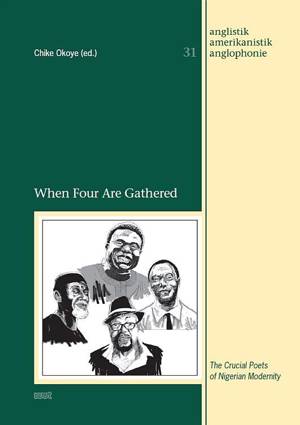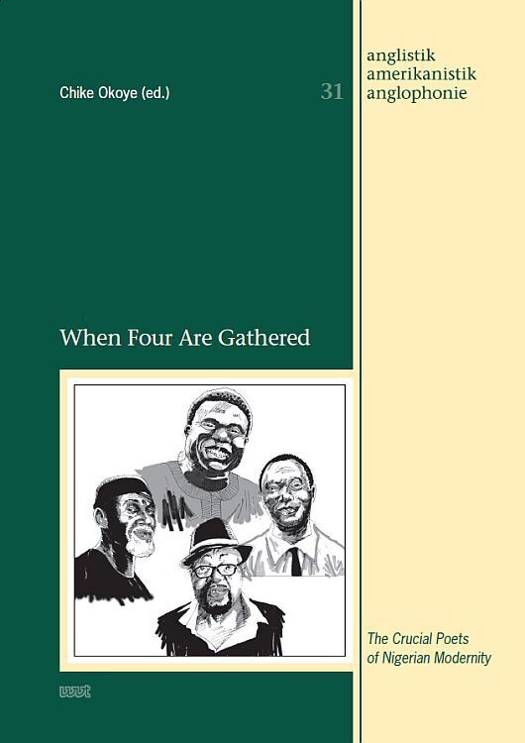
- Afhalen na 1 uur in een winkel met voorraad
- Gratis thuislevering in België vanaf € 30
- Ruim aanbod met 7 miljoen producten
- Afhalen na 1 uur in een winkel met voorraad
- Gratis thuislevering in België vanaf € 30
- Ruim aanbod met 7 miljoen producten
Zoeken
When Four Are Gathered: The Crucial Poets of Nigerian Modernity
€ 27,45
+ 54 punten
Omschrijving
The watershed of Nigeria's modernity took a very poignant turn after the civil war of 1967-1970. New temperaments, tensions, consciousnesses, strains, severances, bonds, perceptions, animosities, forbearances, loves, alliances, lessons, and so on, across the multiethnic divides of the country, materialized. These ever-dynamic states of flux have continued in different degrees and directions to date. Literature, ever-faithful, continues to accompany Nigeria's vicissitudes - poets being arguably the most poignant in response(s) and representations. The literary traditions and the attendant canon of the Chinua Achebe, Wole Soyinka, J.P. Clark-Bekederemo, Christopher Okigbo, Gabriel Okara, and so on era gradually gave way to the Niyi Osundare, Tanure Ojaide, Chimalum Nwankwo, and Odia Ofeimun period. The whole point of this book and its intellectual exercise is to review the subsisting literary canon of an era in Nigeria's literary historicity - that of the crucial period of upheavals in society, polity, and governance - expanding the erstwhile trio of poets to justifiably include Chimalum Nwankwo. They are the four gathered, representative as crucial poets of Nigerian modernity in this critical volume.
"Chike Okoye's audacious attempt to locate Chimalum Nwankwo among the trio of Osundare, Ojaide and Ofeimun in his powerful "quartet of poets" is fully justified in this ground-breaking work. The book's rigorous case-making both for Nwankwo's inclusion in this pantheon and for more critical attention to his profound but grossly understudied oeuvre is foregrounded not only by his contributions to modern Nigerian poetry, but also by the large body of current literature and theoretically nuanced and cohesive evidence it mobilizes. To be sure, Okoye's When Four Are Gathered has calibrated a new critical pathway that has been missing in modern African poetry criticism." -Dr Abba A. Abba, Fellow - British Academy, AHP, DAAD; Winner of the NLNG (2019) and ANA (2019 & 2022) Prizes for Literary Criticism; Senior Lecturer, Federal University Lokoja
"These essays by some of the most vibrant minds in Nigerian literary scholarship come as a critical intervention that provides historical and theoretical accounts of the role poetry has played in shaping the fate of a democratic Nigeria." -Sule Emmanuel Egya, Professor of African Literature and Environmental Humanities, Ibrahim Badamasi Babangida University, Lapai, Nigeria
CONTENTS
Foreword: Poet Undiscovered1
Obi Maduakor
Preface5
Chike Okoye
Chapter One: Trajectories and Tender Currents: Setting the Stage for the Quartet7
Chike Okoye
Chapter Two: "I Sing of a World Reshaped": Activism, Proselytism, and Niyi Osundare's Poetic Legacy51
Reuben Kehinde Akano and Nneoma Otuegbe
Chapter Three: Poetic (Auto)biography: Imaging Eco-Human Health in Tanure Ojaide's Poetry75
Stephen Ese Kekeghe and Chike Okoye
Chapter Four: Postcolonial Nostalgia: Pathos and Memory in the Poetry of Chimalum Nwankwo97
Ikechukwu Emmanuel Asika and Mathias Iroro Orhero
Chapter Five: Tonality and Mood as Drivers of Craft in Odia Ofeimun's Poetry: A Critical Perspective129
Onyebuchi James Ile and Chike Mgbeadichie
Chapter Six: Conclusion: Summary and Postscript151
Chike Okoye
Notes on the Contributors157
"Chike Okoye's audacious attempt to locate Chimalum Nwankwo among the trio of Osundare, Ojaide and Ofeimun in his powerful "quartet of poets" is fully justified in this ground-breaking work. The book's rigorous case-making both for Nwankwo's inclusion in this pantheon and for more critical attention to his profound but grossly understudied oeuvre is foregrounded not only by his contributions to modern Nigerian poetry, but also by the large body of current literature and theoretically nuanced and cohesive evidence it mobilizes. To be sure, Okoye's When Four Are Gathered has calibrated a new critical pathway that has been missing in modern African poetry criticism." -Dr Abba A. Abba, Fellow - British Academy, AHP, DAAD; Winner of the NLNG (2019) and ANA (2019 & 2022) Prizes for Literary Criticism; Senior Lecturer, Federal University Lokoja
"These essays by some of the most vibrant minds in Nigerian literary scholarship come as a critical intervention that provides historical and theoretical accounts of the role poetry has played in shaping the fate of a democratic Nigeria." -Sule Emmanuel Egya, Professor of African Literature and Environmental Humanities, Ibrahim Badamasi Babangida University, Lapai, Nigeria
CONTENTS
Foreword: Poet Undiscovered1
Obi Maduakor
Preface5
Chike Okoye
Chapter One: Trajectories and Tender Currents: Setting the Stage for the Quartet7
Chike Okoye
Chapter Two: "I Sing of a World Reshaped": Activism, Proselytism, and Niyi Osundare's Poetic Legacy51
Reuben Kehinde Akano and Nneoma Otuegbe
Chapter Three: Poetic (Auto)biography: Imaging Eco-Human Health in Tanure Ojaide's Poetry75
Stephen Ese Kekeghe and Chike Okoye
Chapter Four: Postcolonial Nostalgia: Pathos and Memory in the Poetry of Chimalum Nwankwo97
Ikechukwu Emmanuel Asika and Mathias Iroro Orhero
Chapter Five: Tonality and Mood as Drivers of Craft in Odia Ofeimun's Poetry: A Critical Perspective129
Onyebuchi James Ile and Chike Mgbeadichie
Chapter Six: Conclusion: Summary and Postscript151
Chike Okoye
Notes on the Contributors157
Specificaties
Betrokkenen
- Uitgeverij:
Inhoud
- Aantal bladzijden:
- 166
- Taal:
- Engels
- Reeks:
- Reeksnummer:
- nr. 31
Eigenschappen
- Productcode (EAN):
- 9783989400573
- Uitvoering:
- Paperback
- Afmetingen:
- 150 mm x 10 mm
- Gewicht:
- 372 g

Alleen bij Standaard Boekhandel
+ 54 punten op je klantenkaart van Standaard Boekhandel
Beoordelingen
We publiceren alleen reviews die voldoen aan de voorwaarden voor reviews. Bekijk onze voorwaarden voor reviews.







